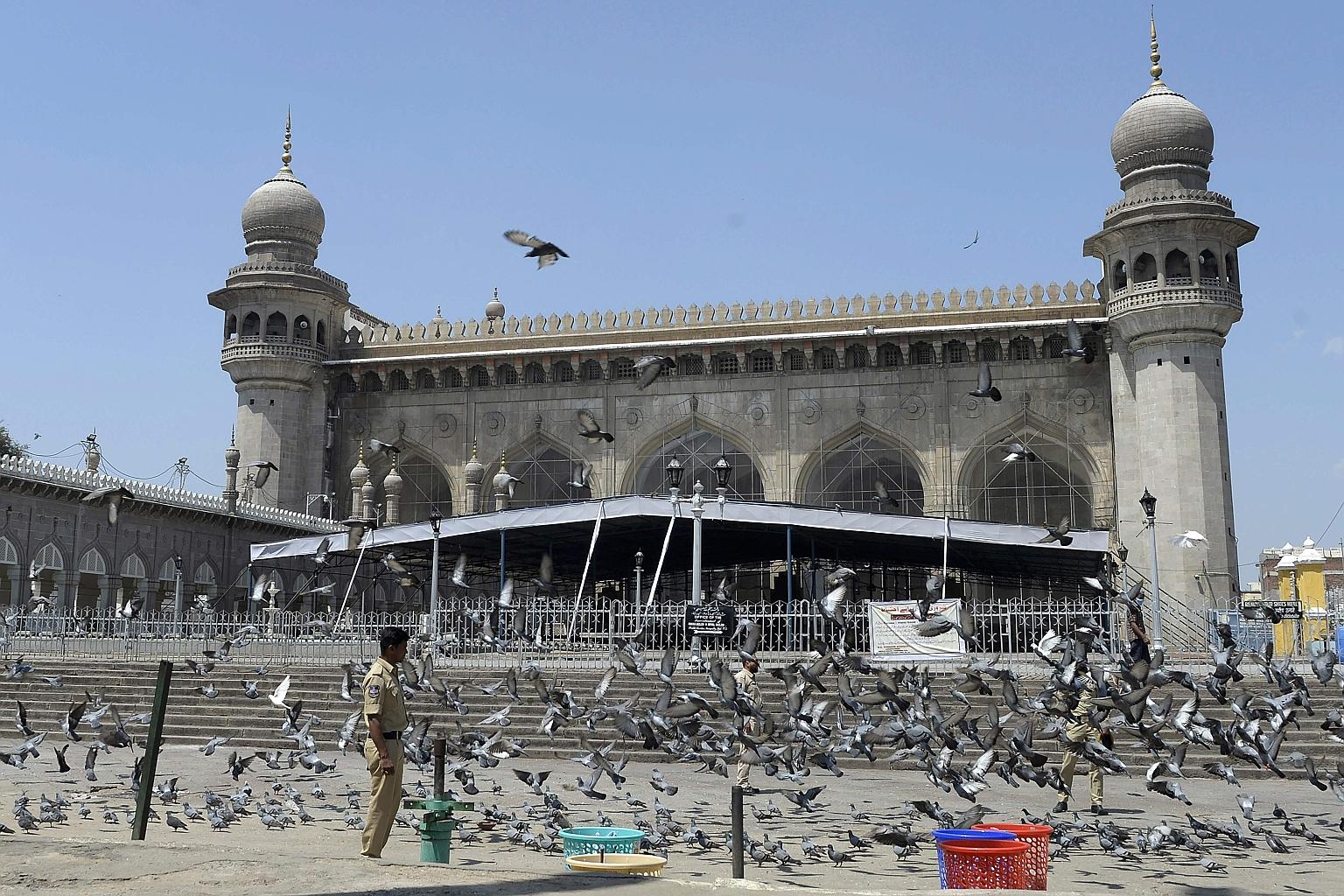Coronavirus pandemic
India prolongs lockdown in 75 districts
Advisory doesn't say how long it will last; covers major cities like Delhi, Mumbai
Sign up now: Get insights on Asia's fast-moving developments

A policeman keeping watch outside Mecca Masjid in Hyderabad yesterday during a 14-hour nationwide curfew imposed to curb the spread of the coronavirus.
PHOTO: AGENCE FRANCE-PRESSE
As the vast majority of Indians stayed indoors during a 14-hour nationwide public curfew that began at 7am yesterday, the government issued an advisory to different state governments for a prolonged lockdown in 75 districts that have reported confirmed coronavirus infections.
This means only those providing essential services, such as firefighting services and grocery shops, will operate in these districts.
Passenger train and metro services, as well as inter-state bus transport, have also been suspended till March 31, as the world's second-most populous country tries to clamp down on the movement of people to contain a worrying spread of the coronavirus.
Prompted by dwindling work opportunities amid the Covid-19 scare, many daily wage earners in Indian cities have begun returning to their villages, raising the spectre of the virus moving from its current limited urban presence to take hold in India's rural areas.
Indian Prime Minister Narendra Modi tweeted in Hindi last Saturday: "Travelling in a crowd increases the risk of (Covid-19) infection. Wherever you're going, it'll pose danger to people there too. It will increase difficulties for your family members and those in your villages."
The government advisory, which was issued yesterday afternoon, does not specify how long the lockdown will continue. The list of 75 districts covers India's capital New Delhi as well as the major cities of Mumbai, Bengaluru and Kolkata.
India has a total of 718 districts.
These new measures come amid growing fears of community transmission in a country with an already overburdened health system. According to government figures, India had 329 active cases with seven deaths due to Covid-19 as of yesterday evening.
On Saturday, a woman in Maharashtra and a man in West Bengal - both without any history of foreign travel - tested positive for the coronavirus.
International flights have been banned for a week starting from yesterday and many Indian airlines have also curtailed domestic operations. The government of Delhi also announced yesterday that it would suspend the arrival of all domestic and international flights at the airport in Delhi until March 31.
Iconic locations across India, such as the Bandra-Worli Sea Link bridge in Mumbai, were empty in a surreal scene yesterday as Indians responded to an appeal by Mr Modi to adhere to the curfew.
Many shared on social media how the rare silence helped bring to life sounds - such as those of birds - usually muffled by the noisy bustle of Indian cities.
At 5pm, however, the silence was shattered with Indians clapping and clanging their steel utensils, blowing conch shells or ringing their prayer bells.
In his address earlier this week, Mr Modi had urged Indians to step onto their balconies or stand at their doors at that hour in a coordinated five-minute standing ovation for medical workers and others on the front line of the battle against the virus, replicating scenes of spontaneous support for medical workers in some European countries.
One resident of Noida, Mr Suvodeep Mukherjee, stepped out onto the balcony of his 16th-floor apartment in the Delhi suburb to clap and play religious chants.
"This will help bring about a positive vibe, especially when there is a lot of fear and negative energy. It is also a way to show support for the brave people who are working to treat those affected and protecting our country," he said.
Dr Saurabh Gupta, an orthopaedic surgeon at a government-run hospital in Karnal in the state of Haryana, told The Straits Times that the 5pm initiative was a good move to extend moral support to one another.
"It applauds our medical professionals, as well as others, who are risking their lives with limited resources," he said. "Any patient can be a carrier of coronavirus. We have to be cautious and test as much as possible."
But there were those who thought the planned adulatory initiative took attention away from the more important task of ensuring protection for medical workers.
In a tweet to Mr Modi, a government-employed surgeon who identified herself only as "M" said: "I don't want your claps. I want your genuine and wholehearted effort in ensuring my well-being. I want personal protective equipment. I want better government strategies. I want to have faith in your actions. Do better."
Many Indian medical professionals have taken to social media to complain about the lack of protective equipment such as masks, gowns and gloves.


